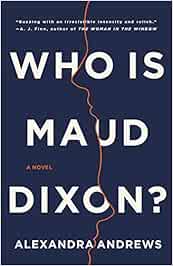2 Stars
I picked up this book because of its many rave reviews. Did I read the same book? Its plot is so contrived and predictable and peopled with characters that left me totally indifferent.Florence Darrow loses a job at a publishing company because of bad behaviour and poor judgment, only to be hired as a personal assistant for Helen Wilcox, a novelist whose tremendously successful debut novel was written under the pseudonym of Maud Dixon. Though she cannot reveal to anyone that she knows Helen’s penname, Florence is happy to take the job, hoping she will be able to pick up some tips to help her write her own novel. Helen suddenly decides they need to take a research trip to Morocco. When the two women arrive in the North African country, there’s a car accident (which the preface reveals) which leads to disappearances, mistaken and stolen identities, and murders.
Neither Florence nor Helen is likeable; though characters need not be likeable, I do want them to be interesting but the women are not that either. Helen is reclusive, mercurial, and has little regard for others. Though she is only 32, why does she behave and sound like someone twice her age? Florence is self-centred, amoral, insecure, full of resentment, and desperately ambitious. It is her inconsistent behaviour that is problematic; for instance, she graduated summa cum laude but when she speaks of social mores, she pronounces mores “like s’mores”? Her questions about writing and literature are so simplistic. And she’s so simple-minded and short-sighted that she can’t foresee complications that might arise if someone in today’s interconnected world attempted identity theft or concealment of a crime? Since I could not care less about what happens to either of them, there was no suspense in what is supposed to be a thriller.
Descriptions of Morocco suggest the author read a guide book. They are certainly not evocative. Only major tourist sites are mentioned, as if the author relied solely on Google, as Florence is wont to do.
The author is described as an editor so I was surprised that this book needs major revision. Characters are included for little reason. For example, Florence’s friendship with Lucy seems irrelevant. Nick too is just another disposable character. And the reader is supposed to believe that Florence meets a childhood friend in Morocco?
At one point Florence mentions that she “tended to look down on books that owed their success to the dramatic machinations of plot.” It is cheap plot manipulation that is used over and over again in the novel. There are so many over-the-top coincidences that require so much suspension of disbelief. Besides Whitney’s appearance, there’s Florence’s oh-so-convenient remembering how to reset a computer password and her miraculous ability to unscrew a brass towel rack. It takes police an inordinate amount of time to arrive. Florence doesn’t ask the important questions and believes the most facile explanations? Helen gives Florence access to her bank accounts on her first day at work? Clues are so heavy-handed that Florence’s cluelessness is unbelievable.
The one positive aspect is the deft prose. The cooing of pigeons “had the aggressively soothing tones of a nursery rhyme in a horror movie.” When Florence feels she is being regarded dismissively, she “wanted to take those expectations and twist them like a pinkie finger until they snapped.” Helen certainly has some wonderful, witty remarks.
So many reviewers have commented on how the novel is cunningly plotted. I cannot agree. A reader does not have to be particularly astute to see through the preposterous plot. The book requires so much avoidance of critical thought that it held little enjoyment for me.

No comments:
Post a Comment